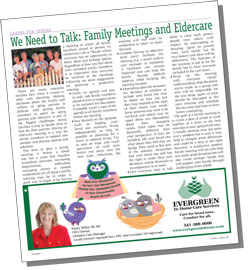 There are many concerns families face when it comes to elder care planning. Making decisions about the health and welfare of aging parents is difficult. And, getting family members to agree on aging parents and eldercare is one of the biggest challenges facing families trying to decide what is best for their parents. Having an eldercare meeting is a way for family members to support one another and discuss options and solutions.
There are many concerns families face when it comes to elder care planning. Making decisions about the health and welfare of aging parents is difficult. And, getting family members to agree on aging parents and eldercare is one of the biggest challenges facing families trying to decide what is best for their parents. Having an eldercare meeting is a way for family members to support one another and discuss options and solutions.
The time to plan a family meeting is before a loved one has a crisis that requires immediate attention. Increasing forgetfulness, difficulties managing money or missed medications are all signs a family meeting may be in order. A good way to begin is by having a meeting in which all family members attend in person, by conference call or “Skype” where everyone has an opportunity to share ideas and feelings openly. Regardless of how you feel about your extended family members, it is imperative that everyone be involved in the meetings. Following are some suggestions for planning a productive meeting:
- Create an agenda and stay on task. Ask family members ahead of time to suggest items to be included for discussion. If possible email a copy of the agenda to all family members before the meeting.
- Stay focused on the purpose, such as helping your loved one maintain living independently as long as possible or planning for a move to assisted living. Try to stay on topic and reach agreement on each item before you move onto the next topic. Otherwise, the meeting will end with no resolutions or “plan” to move forward.
- Consider having an objective third party facilitate the meeting (e.g. a social worker, care manager or mediator). A facilitator can remain impartial and can help the family discuss difficult subjects while keeping the meeting focused.
- Depending upon the situation, the decision of whether to include your loved one may be based on how you feel they may respond to the topic of their future care needs. Some persons may want to be involved and others may be upset about any discussions about their changing needs. Their input may be drastically different than your perspective. If they are included, ask your loved one what issues they feel they are facing. They need to feel part of the solution. Remember that your loved one still has the right to make their own decisions, unless dementia or incompetence is an issue.
- Give everyone time to talk. Make it clear each person should treat others with respect. No interrupting or shouting. Agree on ground rules. Each family has its own history and there will be differences. The function of the meeting is not to fix the family but to have everyone included in the care team.
- Wrap up the meeting with everyone clearly understanding what decisions you’ve made as a group and who will be responsible for the next steps. Agree on what should be discussed at the next meeting and schedule the next date and time to meet before concluding.
The goal of a family meeting is to create a plan of action to work together as a team in the best interests of your aging loved ones. A family meeting may not solve every problem but it may it may help to mitigate some dilemmas and could be a step in the right direction. A productive, positive family meeting will not only help you make good decisions but will also create stronger bonds that will support your family through challenging times ahead.
As Seen in U Magazine: We Need to Talk: Family Meetings and Eldercare
Spring 2014

